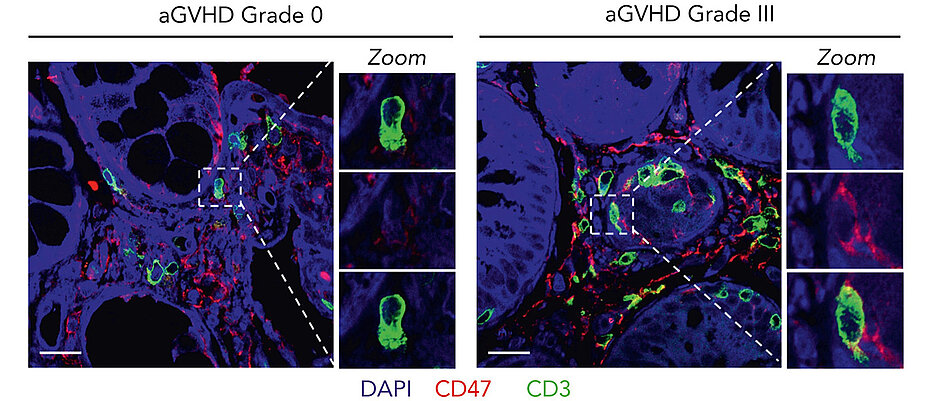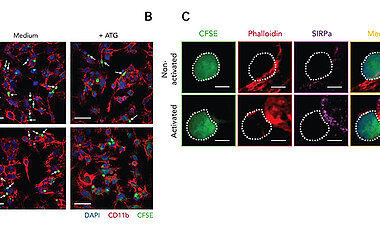The Tricks of Harmful T Cells After Stem Cell Transplantation
10/07/2025A new study shows: Blocking the surface protein CD47 protects against graft-versus-host disease after allogeneic stem cell transplantation.

As part of the Collaborative Research Centre (CRC) TRR 221, a study identified the surface protein CD47 as a key factor that enables alloreactive T cells to evade clearance by macrophages and exacerbate graft-versus-host disease (GvHD). Targeting CD47 with antibody therapy could improve the clearance of pathogenic T cells and thus prevent GvHD after allogeneic stem cell transplantation.
An allogeneic stem cell transplant, i.e. the transplantation of stem cells from another donor, can be life-saving for patients whose own bone marrow can no longer produce healthy blood cells. However, the therapy also harbours risks: Certain immune cells from the donor, known as T cells, can recognise the recipient's body as foreign and trigger an excessive defence reaction. This dangerous complication is known as graft-versus-host disease (GvHD).
As part of the Collaborative Research Centre/Transregio SFB/TRR 221 funded by the German Research Foundation, the University Hospitals of Erlangen, Regensburg and Würzburg are jointly investigating innovative strategies for controlling the graft-versus-host (GvHD) and graft-versus-leukaemia (GvL) effects. The aim is to improve the safety and efficacy of allogeneic stem cell transplantation (allogeneic haemotopoietic stem cell transplantation, allo-HCT). For example, the researchers investigated why the inflammatory donor T cells that drive GvHD are not effectively removed by the immune system, more specifically by macrophages, which are also known as scavenger cells or cleansers. In doing so, the researchers uncovered a hidden survival trick of the harmful donor T cells.
T Cells Send a "Don't Eat Me" Signal to the Immune System with CD47
The harmful donor T cells express unusually high concentrations of the protein CD47. This is a surface protein that signals to the macrophages: "Don't eat me". This overexpression was observed both in patients with GvHD and in mouse models.
"This is the first time we have clearly linked CD47 to the graft-versus-host reaction," says Dr Haroon Shaikh from the Medical Clinic and Polyclinic II of the University Hospital of Würzburg (UKW). The immunologist from Professor Andreas Beilhack's working group published the results in the renowned scientific journal Blood. He shares first authorship with Dr. Cindy Flamann from the group led by Associate Professor Dr. Heiko Bruns from the University Hospital Erlangen.
Blocking CD47 Signalling Helps to Remove Harmful Cells, Reduce Inflammation and Improve Chances of Survival
"It became exciting when we blocked CD47 with antibodies," reports Haroon Shaikh. "This is because blocking restored the macrophages' ability to phagocytose and thus eliminate the alloreactive T cells. In our mice, we observed that the harmful cells were eliminated more effectively, the inflammation in the intestine decreased and their chances of survival improved. In addition, donor T cells without CD47 caused significantly less graft-versus-host disease and led to better outcomes."
"The study shows the particular strength of our collaboration in CRC/TRR 221 GvH-GvL and its clear translational approach," emphasises Andreas Beilhack. "Our results open up promising clinical potential for the blockade of CD47 in the treatment of GvHD," emphasises Heiko Bruns. On this basis, the team is already preparing the first clinical trials.
Publication
Flamann C*, Shaikh H*, Matos C, Kreutz M, Ali H, Kern MAG, Büttner-Herold M, Jacobs B, Völkl S, Lischer C, Kellner C, Berges J, Bitterer K, Saul D, Goel M, Link-Rachner CS, Zernecke A, Weber D, Mougiakakos D, Mackensen A, Beilhack A, Bruns H. Augmented CD47 expression impairs alloreactive T-cell clearance after allo-HCT. Blood. 2025 Sep 11;146(11):1359-1373. doi: 10.1182/blood.2023023056. PMID: 40332470.
Additional images







